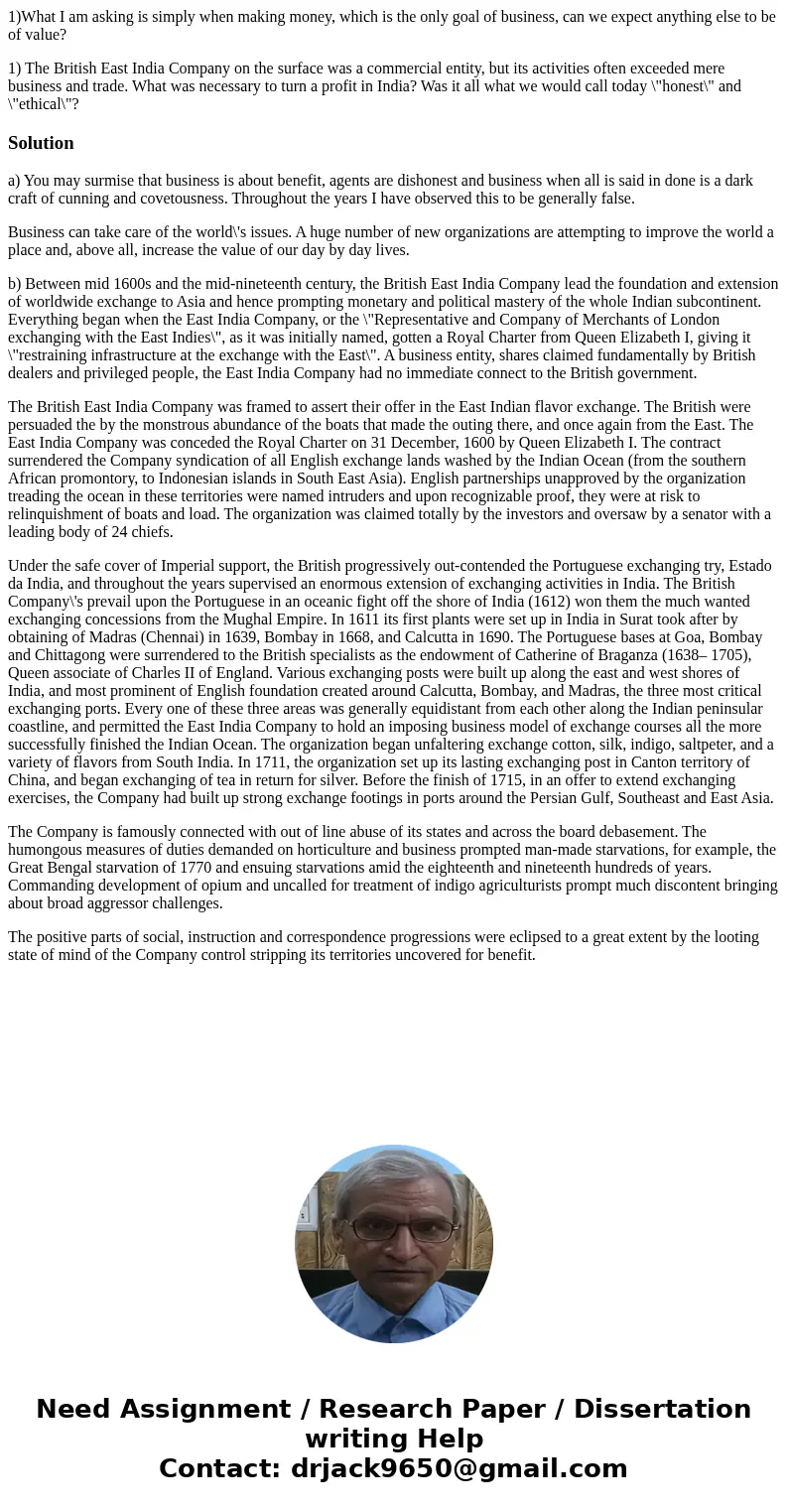1What I am asking is simply when making money which is the o
1)What I am asking is simply when making money, which is the only goal of business, can we expect anything else to be of value?
1) The British East India Company on the surface was a commercial entity, but its activities often exceeded mere business and trade. What was necessary to turn a profit in India? Was it all what we would call today \"honest\" and \"ethical\"?
Solution
a) You may surmise that business is about benefit, agents are dishonest and business when all is said in done is a dark craft of cunning and covetousness. Throughout the years I have observed this to be generally false.
Business can take care of the world\'s issues. A huge number of new organizations are attempting to improve the world a place and, above all, increase the value of our day by day lives.
b) Between mid 1600s and the mid-nineteenth century, the British East India Company lead the foundation and extension of worldwide exchange to Asia and hence prompting monetary and political mastery of the whole Indian subcontinent. Everything began when the East India Company, or the \"Representative and Company of Merchants of London exchanging with the East Indies\", as it was initially named, gotten a Royal Charter from Queen Elizabeth I, giving it \"restraining infrastructure at the exchange with the East\". A business entity, shares claimed fundamentally by British dealers and privileged people, the East India Company had no immediate connect to the British government.
The British East India Company was framed to assert their offer in the East Indian flavor exchange. The British were persuaded the by the monstrous abundance of the boats that made the outing there, and once again from the East. The East India Company was conceded the Royal Charter on 31 December, 1600 by Queen Elizabeth I. The contract surrendered the Company syndication of all English exchange lands washed by the Indian Ocean (from the southern African promontory, to Indonesian islands in South East Asia). English partnerships unapproved by the organization treading the ocean in these territories were named intruders and upon recognizable proof, they were at risk to relinquishment of boats and load. The organization was claimed totally by the investors and oversaw by a senator with a leading body of 24 chiefs.
Under the safe cover of Imperial support, the British progressively out-contended the Portuguese exchanging try, Estado da India, and throughout the years supervised an enormous extension of exchanging activities in India. The British Company\'s prevail upon the Portuguese in an oceanic fight off the shore of India (1612) won them the much wanted exchanging concessions from the Mughal Empire. In 1611 its first plants were set up in India in Surat took after by obtaining of Madras (Chennai) in 1639, Bombay in 1668, and Calcutta in 1690. The Portuguese bases at Goa, Bombay and Chittagong were surrendered to the British specialists as the endowment of Catherine of Braganza (1638– 1705), Queen associate of Charles II of England. Various exchanging posts were built up along the east and west shores of India, and most prominent of English foundation created around Calcutta, Bombay, and Madras, the three most critical exchanging ports. Every one of these three areas was generally equidistant from each other along the Indian peninsular coastline, and permitted the East India Company to hold an imposing business model of exchange courses all the more successfully finished the Indian Ocean. The organization began unfaltering exchange cotton, silk, indigo, saltpeter, and a variety of flavors from South India. In 1711, the organization set up its lasting exchanging post in Canton territory of China, and began exchanging of tea in return for silver. Before the finish of 1715, in an offer to extend exchanging exercises, the Company had built up strong exchange footings in ports around the Persian Gulf, Southeast and East Asia.
The Company is famously connected with out of line abuse of its states and across the board debasement. The humongous measures of duties demanded on horticulture and business prompted man-made starvations, for example, the Great Bengal starvation of 1770 and ensuing starvations amid the eighteenth and nineteenth hundreds of years. Commanding development of opium and uncalled for treatment of indigo agriculturists prompt much discontent bringing about broad aggressor challenges.
The positive parts of social, instruction and correspondence progressions were eclipsed to a great extent by the looting state of mind of the Company control stripping its territories uncovered for benefit.

 Homework Sourse
Homework Sourse